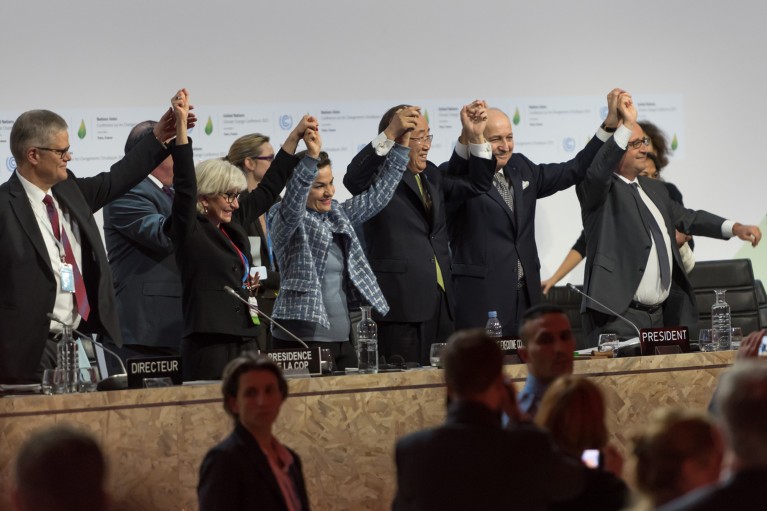Science
Related: About this forumDon't overshoot: why carbon dioxide removal will achieve too little, too late.
This a Nature Editorial: Don’t overshoot: why carbon dioxide removal will achieve too little, too late.
Subtitle:
I have not been shy about stating that we are already at "too little, too late." Even if we were to fully embrace the only technology that will actually address, in any way, the extreme global heating we are now observing, nuclear energy - this after decades of mindless demonization driven by selective attention - it would take decades to build the large number of reactors that might save what is left to save and restore what can be restored.
I'm not sure that the full editorial is open to the public, so here are some excerpts:

The caption:
Jubilation over reaching an agreement on climate-change measures has turned to concern about the practicalities of making them work.Credit: Jonathan Raa/Pacific Press/LightRocket/Getty
Excerpts:
Scientists had good reason to be sceptical. Under most plausible scenarios, average temperatures will overshoot the 1.5 °C target — a fact that was confirmed in a 2018 special report from the Intergovernmental Panel on Climate Change. The report suggests that, to extract enough carbon dioxide from the atmosphere to bring the temperature rise below the limit, methods to remove carbon from the atmosphere — yet to be tested at scale — will be needed. Scientists had other unanswered questions, too: what will happen while temperatures are above the threshold? How hard will it be to reverse the rising mercury in our thermometers?...
The first link in this text is titled "Is the 2?°C world a fantasy?" The second link is from an IPCC report stating that there is little or no evidence that we will hold the temperature rise to 1.5 °C.
In response to the question in the first title, "Is the 2?°C world a fantasy?" it seems so; there is no apparent change from the reactionary fantasy that so called "renewable energy" will save the day, despite the fact that there is no evidence it has done, is doing, or will do so. No amount of reality will stop the squandering trillions on this quasi-religious faith based public affectation.
Another excerpt on the scale required:
Planting trees, of course, assumes that there will be water to grow them, and that they won't burn up and catch fire, or be blown apart by mega storms, which is in fact what they are doing under the extreme global heating event now well underway.
Top climate scientists are sceptical that nations will rein in global warming
Moreover, higher temperatures, even for a brief period, increase the risk of hitting tipping points that could kick the Earth system, or parts of it, into a completely new state, a conclusion underscored in an August study in Nature Communications by Annika Högner at the Potsdam Institute for Climate Impact Research in Germany and Tessa Möller at the International Institute for Applied Systems Analysis in Laxenburg, Austria (T. Möller et al. Nature Commun. 15, 6192; 2024) and their colleagues...
After extensively studying the issue over the years, I have convinced myself that CO2 removal is just at the edge of feasibility, for example, under certain nuclear powered regimes involving air based Brayton cycles, not that anyone cares what I think, except, perhaps my son. However the question is where to put the carbon once it's removed. I note, with some measure of terror, that reducing carbon dioxide to elemental carbon requires all the primary energy released by burning fossil fuels to be generated all over again, and then adding some more to account for the entropy of mixing.
We have dumped all the responsibility for so doing on future generations, generations who will live in a ruined extremely damaged world.
History will not forgive us, nor should it.
OldBaldy1701E
(6,409 posts)We, being the arrogant, self absorbed species that we are, will not survive such actions because we are the cause of it and would rather go down kicking and screaming as opposed to changing our society to not be destructive.
But, it will be completely deserved. And you are right, history will not forgive us. Not that anyone making lots of money from the destruction will give a rats ass about that. Or anything, for that matter.
jimfields33
(19,134 posts)If the current human race extinct, it will be the sixth time in history that we know of. How many even know this?
OldBaldy1701E
(6,409 posts)Yet another sign of overblown arrogance... ignoring history because it isn't what the person wants to hear.
We as a species don't care about any of that. We care about the laying up of treasure and who was voted off of 'Survivor'.
We will get what we deserve. Mother Earth will see to it.
jimfields33
(19,134 posts)It’s a shame but learning the hard way is in many people’s DNA.